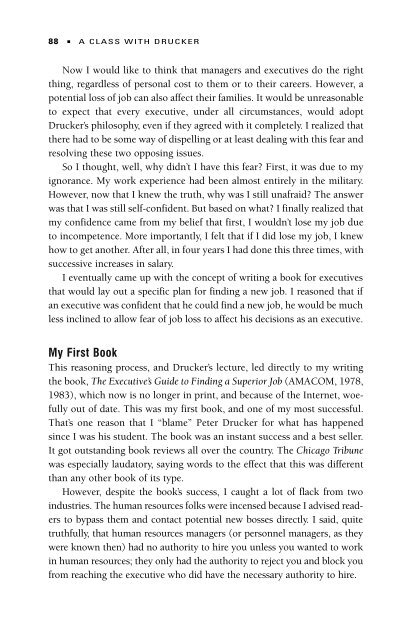A Class with Drucker - Headway | Work on yourself
A Class with Drucker - Headway | Work on yourself
A Class with Drucker - Headway | Work on yourself
You also want an ePaper? Increase the reach of your titles
YUMPU automatically turns print PDFs into web optimized ePapers that Google loves.
88 ■ A CLASS WITH DRUCKER<br />
Now I would like to think that managers and executives do the right<br />
thing, regardless of pers<strong>on</strong>al cost to them or to their careers. However, a<br />
potential loss of job can also affect their families. It would be unreas<strong>on</strong>able<br />
to expect that every executive, under all circumstances, would adopt<br />
<str<strong>on</strong>g>Drucker</str<strong>on</strong>g>’s philosophy, even if they agreed <str<strong>on</strong>g>with</str<strong>on</strong>g> it completely. I realized that<br />
there had to be some way of dispelling or at least dealing <str<strong>on</strong>g>with</str<strong>on</strong>g> this fear and<br />
resolving these two opposing issues.<br />
So I thought, well, why didn’t I have this fear? First, it was due to my<br />
ignorance. My work experience had been almost entirely in the military.<br />
However, now that I knew the truth, why was I still unafraid? The answer<br />
was that I was still self-c<strong>on</strong>fident. But based <strong>on</strong> what? I finally realized that<br />
my c<strong>on</strong>fidence came from my belief that first, I wouldn’t lose my job due<br />
to incompetence. More importantly, I felt that if I did lose my job, I knew<br />
how to get another. After all, in four years I had d<strong>on</strong>e this three times, <str<strong>on</strong>g>with</str<strong>on</strong>g><br />
successive increases in salary.<br />
I eventually came up <str<strong>on</strong>g>with</str<strong>on</strong>g> the c<strong>on</strong>cept of writing a book for executives<br />
that would lay out a specific plan for finding a new job. I reas<strong>on</strong>ed that if<br />
an executive was c<strong>on</strong>fident that he could find a new job, he would be much<br />
less inclined to allow fear of job loss to affect his decisi<strong>on</strong>s as an executive.<br />
My First Book<br />
This reas<strong>on</strong>ing process, and <str<strong>on</strong>g>Drucker</str<strong>on</strong>g>’s lecture, led directly to my writing<br />
the book, The Executive’s Guide to Finding a Superior Job (AMACOM, 1978,<br />
1983), which now is no l<strong>on</strong>ger in print, and because of the Internet, woefully<br />
out of date. This was my first book, and <strong>on</strong>e of my most successful.<br />
That’s <strong>on</strong>e reas<strong>on</strong> that I “blame” Peter <str<strong>on</strong>g>Drucker</str<strong>on</strong>g> for what has happened<br />
since I was his student. The book was an instant success and a best seller.<br />
It got outstanding book reviews all over the country. The Chicago Tribune<br />
was especially laudatory, saying words to the effect that this was different<br />
than any other book of its type.<br />
However, despite the book’s success, I caught a lot of flack from two<br />
industries. The human resources folks were incensed because I advised readers<br />
to bypass them and c<strong>on</strong>tact potential new bosses directly. I said, quite<br />
truthfully, that human resources managers (or pers<strong>on</strong>nel managers, as they<br />
were known then) had no authority to hire you unless you wanted to work<br />
in human resources; they <strong>on</strong>ly had the authority to reject you and block you<br />
from reaching the executive who did have the necessary authority to hire.


